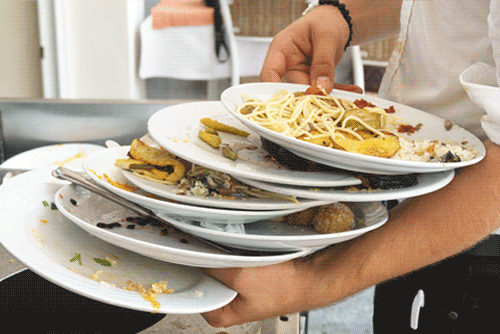To doggy bag or not to doggy bag – why restaurants are risk averse

It is a contentious issue, but some restaurants would rather throw out their leftover food than give customers a doggy bag.
Of course, there are health issues to take account of. Leftover food that is poorly stored or reheated in the wrong way can cause sickness and sometimes lead to litigation.
Yet, more than seven million tonnes of food are thrown out every year in Australia and that is problematic.
The decision to throw food out is purely a restaurant’s own as there are no laws to prohibit packing up leftovers in a container and sending it off with the customer.
Some restaurants like Fitzroy’s Moroccan Soup Bar encourage its customers to bring whatever they can to take their food away.
Founder Hana Assafiri told Good Food, "I always encourage people to take leftovers home if they want to. It's ridiculous that restaurants should have to fear litigation, and insurance premiums going up, just because of one or two irresponsible individuals who leave their leftovers in the car for 10 days before consuming them.
“We're better than that. We should be able to have a reasonable conversation with our customers and trust them to be responsible if they want to take their food home."
The Department of Health warns against the dangers of doggy bags and highlights risks including food poisoning. It says food should be refrigerated within two hours of taking it home and reheated at at least 75 degrees.
Scott Brown, director of House Made Hospitality, says education is key.
"You've got to try to minimise food sitting in that danger zone as much as possible, and some food products are more susceptible than others," Brown told Good Food.
"Proteins such as seafood and chicken fall into the super high-risk category. In that case, we'd just explain why they'd need to get it into the fridge within a shorter period of time.
“We put so much time and effort into preparing and presenting our food, it would break our hearts to just throw it in the bin."
Some restaurateurs are coy about the matter.
"Some restaurants are happy to pack up food, others bluntly refuse," says Callan Boys, editor of The Sydney Morning Herald Good Food Guide. "Totti's in Rozelle packaged our table's leftover roast chook and potatoes the other week – which tasted even better for lunch the next day.
“But next week, a restaurant at Crown wouldn't let my dining mate take home some rib-eye steak left on the table."
In NSW and Victoria, once a customer takes leftovers, what happens next is the customer’s responsibility. However, a bout of food poisoning could still lead to a lawsuit.
The maximum penalty for serving unsafe food is $250,000.
To mitigate any risk restaurants could time stamp containers and provide storage instructions. This also acts as a defence against litigation.
Ovolo in Woolloomooloo and other restaurants will soon require customers to sign a waiver.
"This policy will ensure that we are not liable for anything that may happen once food has been taken off our premises. We can't guarantee the food will be safe to eat when the diner chooses to come back to it," says Ian Curley, the national director of kitchen operations for Ovolo.
"Once we have the waiver in place we will feel more comfortable with [allowing doggy bags]."
Restaurants must be risk averse, but compromises for those who don’t do leftovers look to be on the horizon.
Irit Jackson, 31st May 2022







